Since humans began domesticating felines eons ago, they have been curious about puberty in cats.
Humans go through a prolonged period, years, of adolescence, that includes mood swings, behavioral changes, and hormone imbalances. Felines go through similar changes during their adolescence, which might surprise you. The process takes months.
So, do cats go through puberty? The short answer is yes. Let’s find out more.
When Do Cats Go Through Puberty?
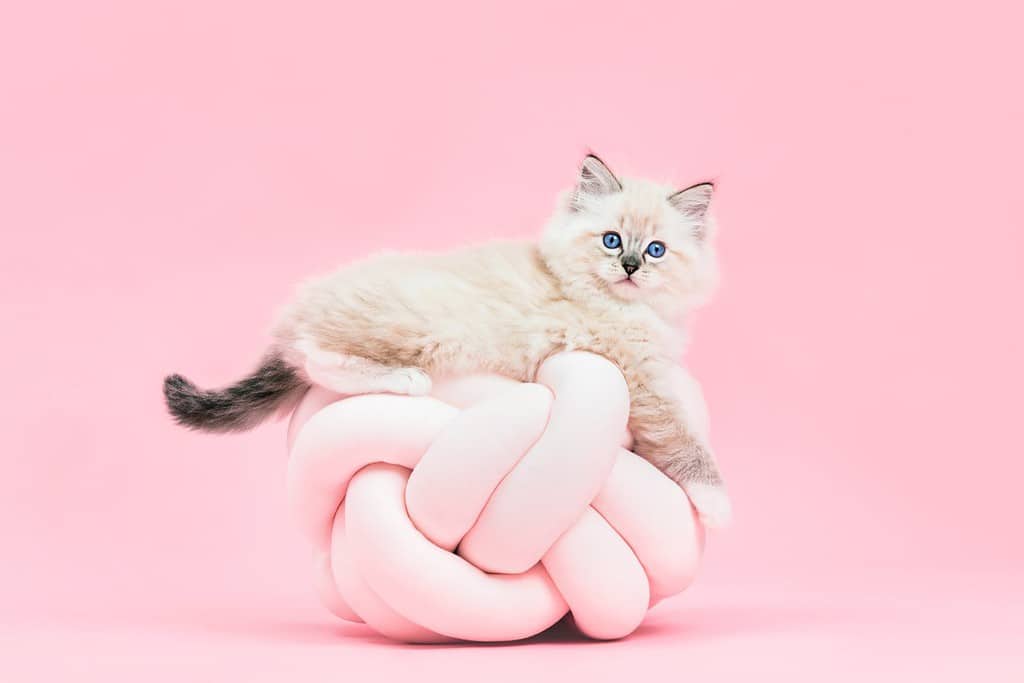
Puberty in cats depends on the breed, size, and other factors.
©PHOTOCREO Michal Bednarek/Shutterstock.com
Kittens generally experience puberty anywhere between three and five months old. The growth period will last about half a year.
Some breeds hit puberty early, including the Siamese or the Birman. They’ll grow out of adolescence between four and five months old.
Other feline breeds begin their sexual maturity journey after around a year. Late-maturing kittens are generally larger and have long hair like Norwegian Forest cats or Maine Coons.
Signs to Look For
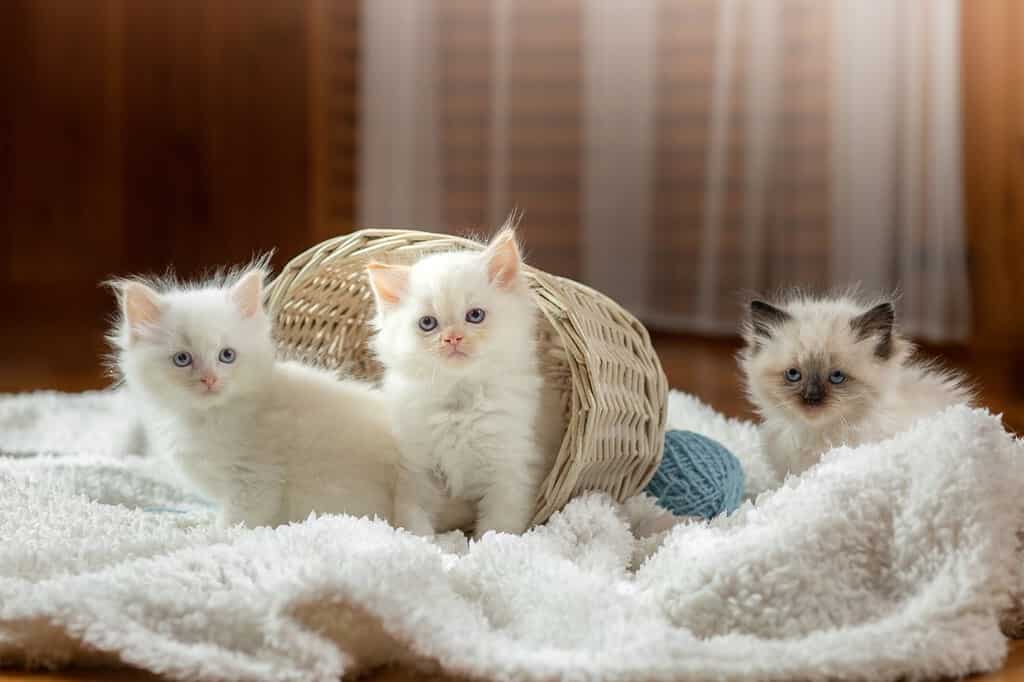
Puberty in kittens is subtle compared to other animals.
©dezy/Shutterstock.com
Before you bring a new kitten home, you need to understand how the transition to adulthood will affect them. Their hormones will fluctuate significantly, and their behavior will change.
Once you have the signs to look for, you’ll be able to support your furry friend during this period.
Inseminating Cats
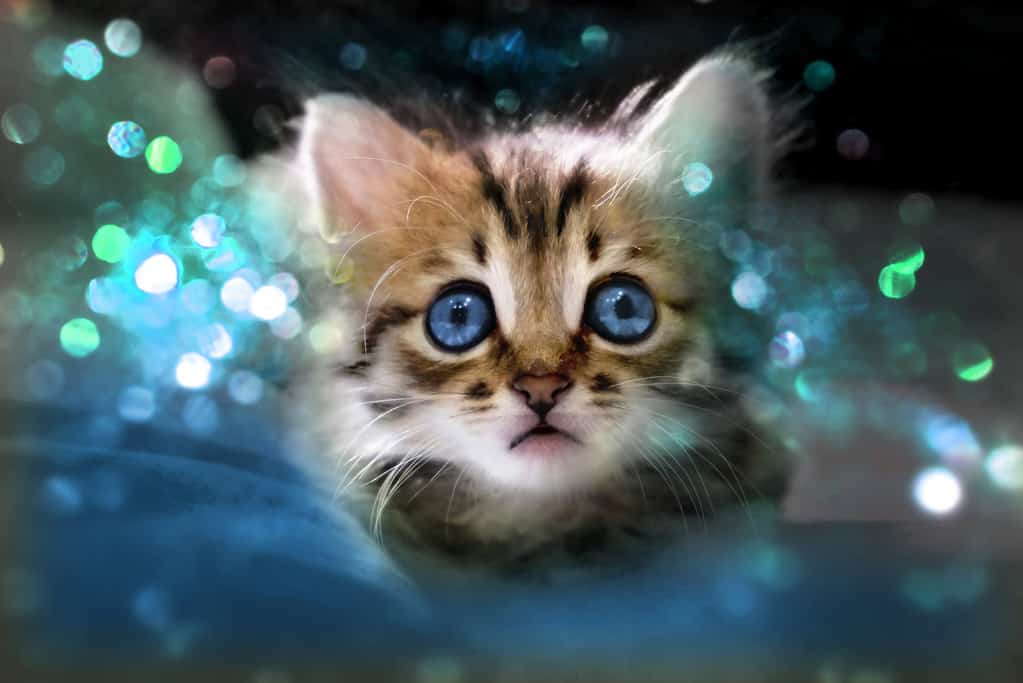
Your kitten may urinate outside their litter box during puberty.
©Elena Kurkutova/iStock via Getty Images
If your cat can get other cats pregnant, you’ll mostly notice behavioral changes during puberty. The journey to adulthood will usually occur between four and six months of age. They become sexually mature at this time and can breed at any time. Ensure that you get your pet fixed after their growth plates close.
Behavioral signs to look for include:
- Spraying
- Trying to assert dominance over other cats
- Vocalizing
- Restlessness
Your kitten might also have increased anxiety, insecurity, and destroy things more frequently.
Your feline friend will also experience physical changes that include enlarged testicles and spine development on their penis. This is due to increased testosterone levels and is not a cause of concern.
Cats That Can Get Pregnant
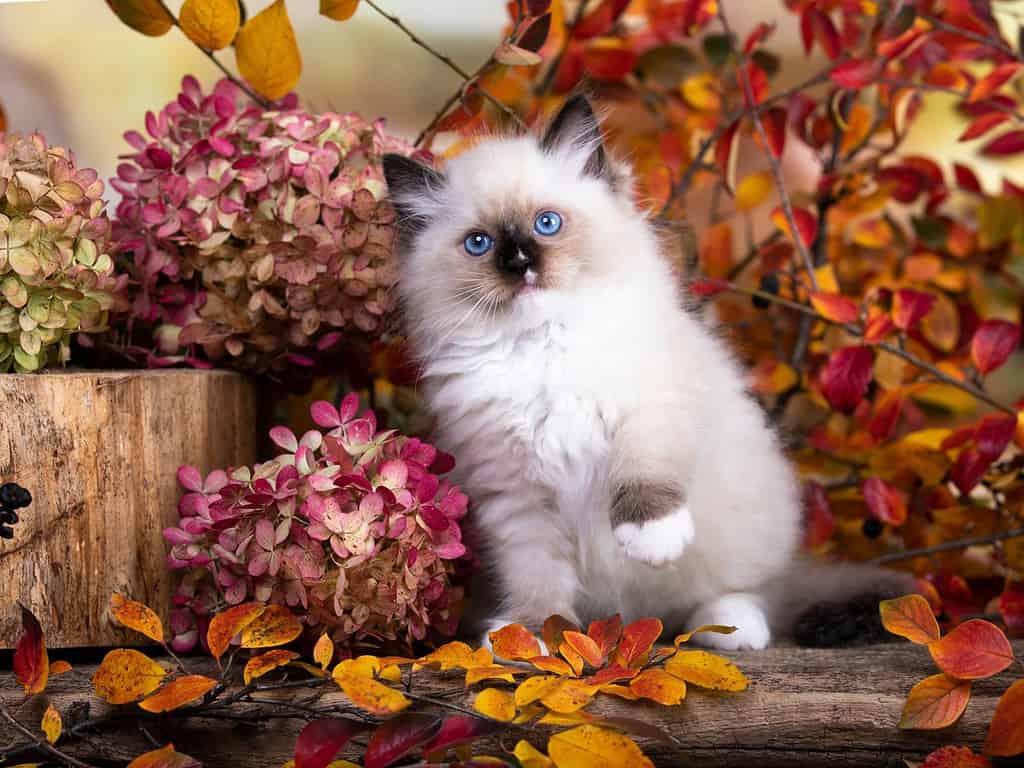
Cats might “call” for mates during puberty.
©Liliya Kulianionak/Shutterstock.com
If your cat can get pregnant, you can expect them to go into their first heat anywhere between four to six months old. Some breeds don’t experience this until 18 months old while others will experience it a month early.
Their heat cycle is also called the estrous cycle. The specific timing depends on the breed and size of your kitten. The time of year, environment, and food also affect when your kitten enters their first heat.
Behavioral signs to keep an eye out for include:
- Vocalizing
- Rolling on the floor
- Licking their swollen genitals
- Agitated pacing
- Assuming a mating posture
Your feline will also be anxious, stressed, and nervous. They will lash out at other cats during the beginning stages of their heat but want to breed later. The animal can become pregnant during their first heat. Make sure that you fix your pet according to the guidance of your vet.
When in puberty, your kitten won’t bleed. There might be slight bloody or clear discharge.
Behavioral Changes

Your cat, if it can get pregnant, will go into heat during specific months of the year.
©OksanaSusoeva/Shutterstock.com
Whether you own a small or large cat, and no matter the breed, some behavioral changes are common to all felines. Here are some signs your cat is going through puberty:
- They won’t leave your side
- Destroying anything they can
- Lashing out at other animals
- Trying to escape
How to Help Your Cat Through Puberty
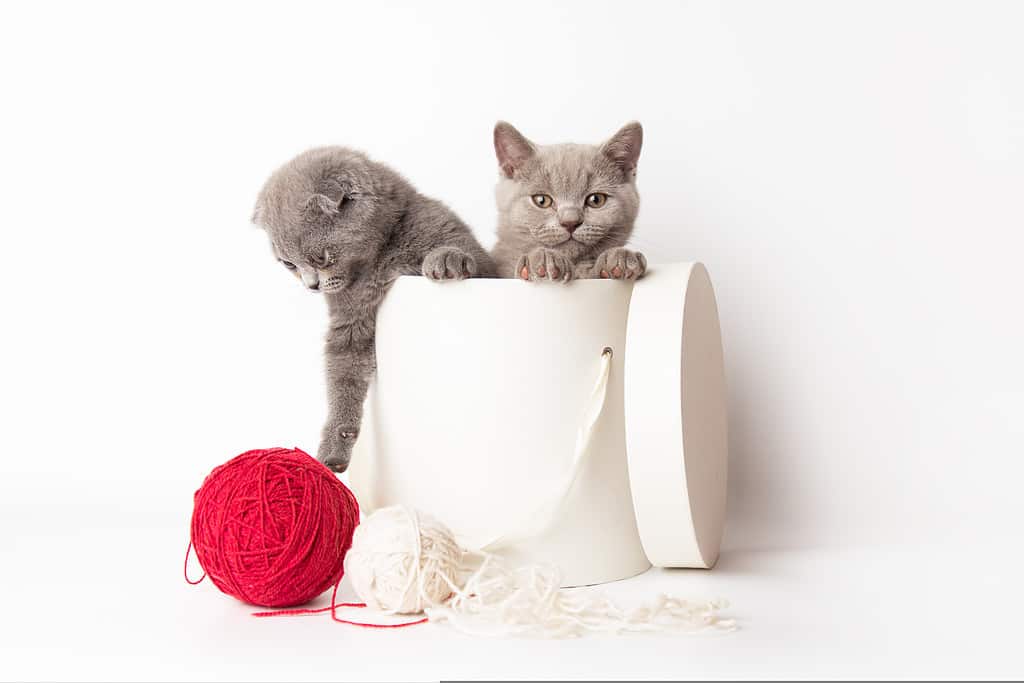
Cats release pheromones during puberty.
©YanaVasileva/iStock via Getty Images
While your kitten is going through puberty, it is going through intense hormonal changes. These hormones regulate many bodily processes through signals.
When making the journey to adulthood, these integral functionary parts are spiking and bringing huge changes to your kitten’s life. These changes, both internal and external, are quite numerous. It will be difficult for your kitten to keep up.
Here is how you can help them through.
Prepare Supplies
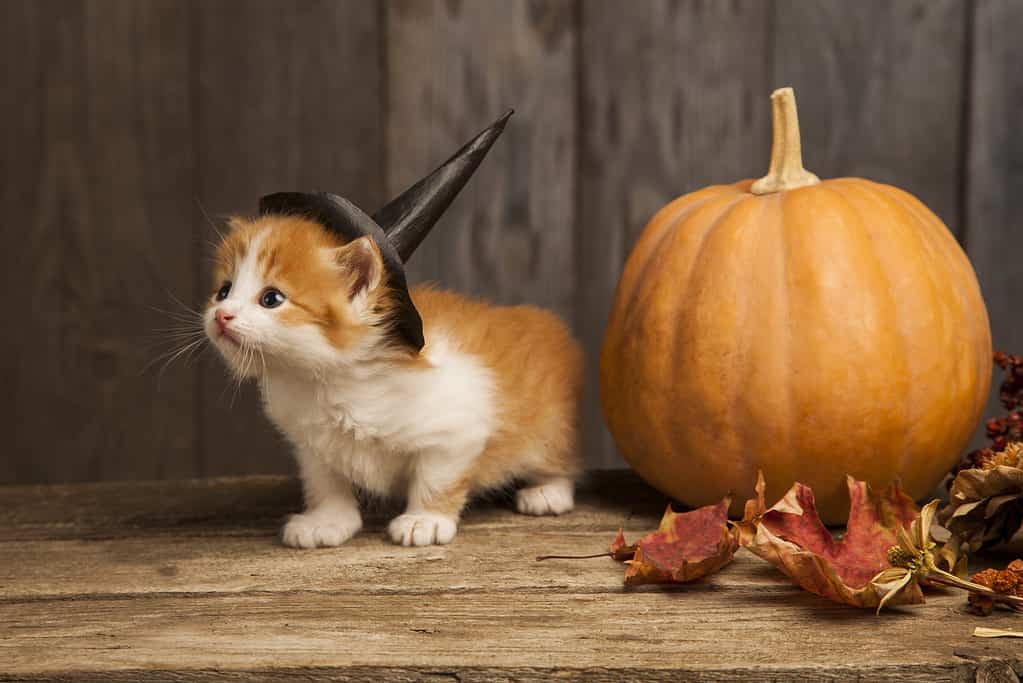
Kittens will roll on the floor often during puberty.
©Chepko/ via Getty Images
Before your kitten starts maturing, make sure you have all the supplies necessary. That way you can focus on your pet instead of having to make multiple trips to get them what they need.
If you have a cat that can get pregnant, it won’t bleed during its first heat. There might be a bit of bloody discharge. If you’re seeing a lot, take your animal to the vet immediately.
You’ll want to buy pee pads for the kitten’s designated area of the house. You’ll also want to buy scratch guards for your furniture. Make sure to remove any carpeting in the area so that it does not get covered in spray.
You might also want to invest in a journal for yourself so you can track the progress of your pet’s growth.
Keep Them Separate from Other Pets
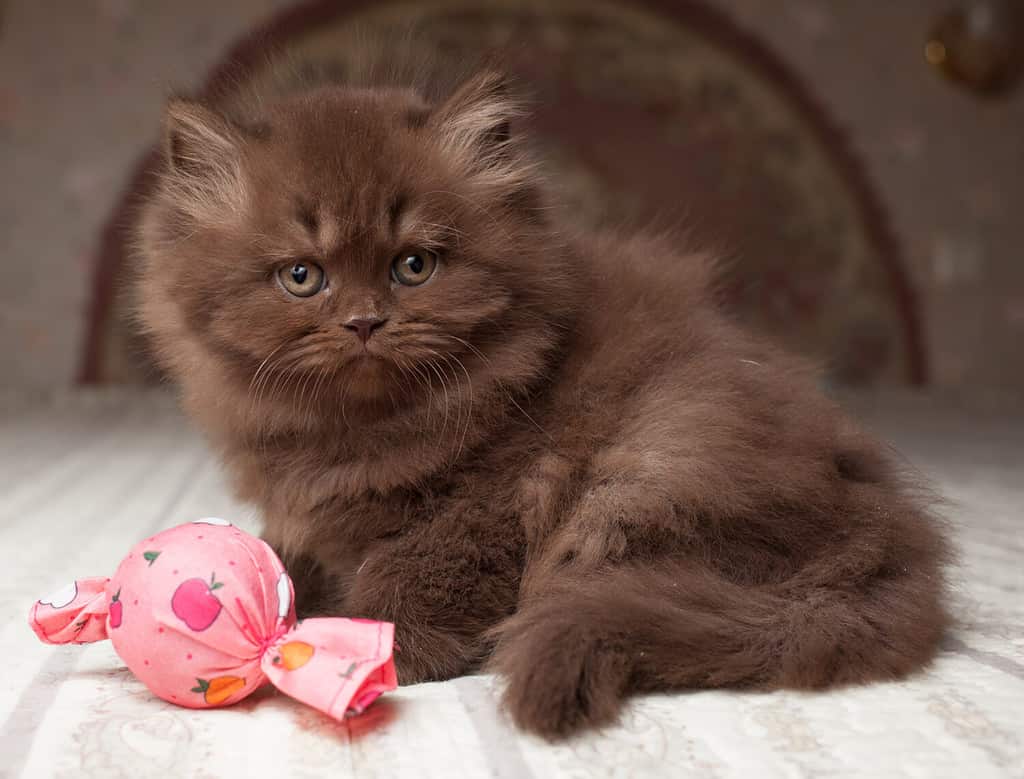
Kittens can be territorial during puberty.
©Rutina/Shutterstock.com
If your kitten is going through puberty, it’s a good idea to keep them separate from other animals. If you have dogs, birds, or rodents (or something else), your kitten might suddenly act aggressively towards them.
With other cats, they’ll guard food, water, and resting places.
If possible, section off a room in your home or apartment for your kitten Get a gate for the door that’s too high for your feline friend to jump over. You’ll want to put pee pads in the room, as well as bedding, scratching posts, and a litter box.
Keep Them Inside
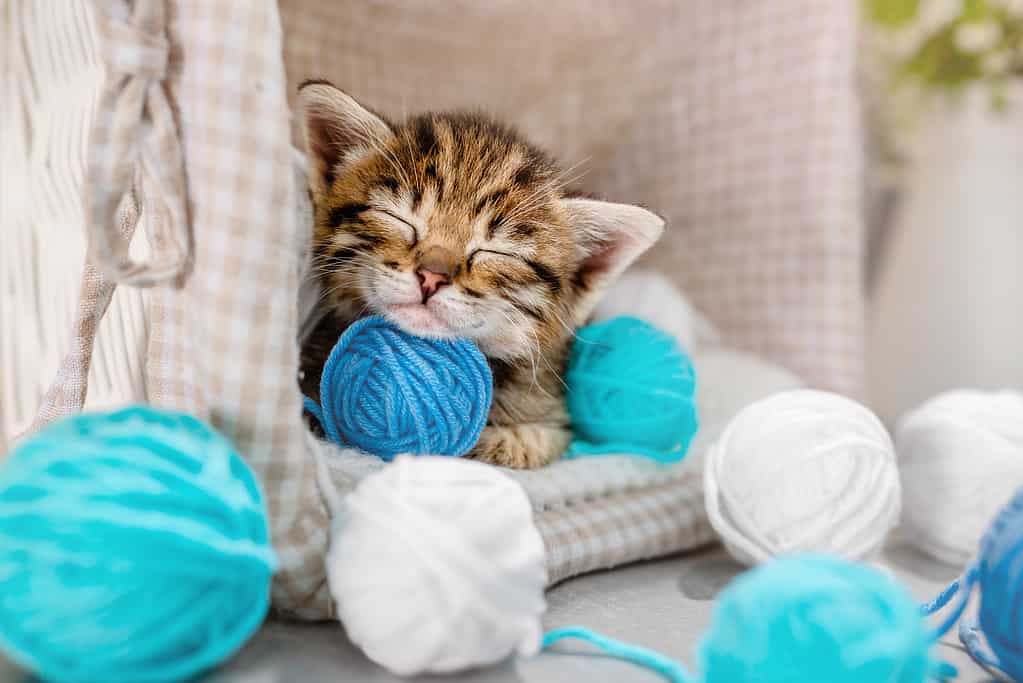
Cats are invasive species that harm native wildlife.
©Siarhei SHUNTSIKAU/iStock via Getty Images
If you’re a domesticated cat owner, you should keep your cat indoors. Some people claim that felines should be allowed outside and keeping them indoors limits their freedom, but this is not correct. Cats viciously kill birds and small animals. Plus, they ruin the natural environment.
For cats in puberty, you’ll have to keep them from escaping (because they will desperately try). Seal all the exits, close the blinds, and distract them with extra play if necessary.
Help Them Relax
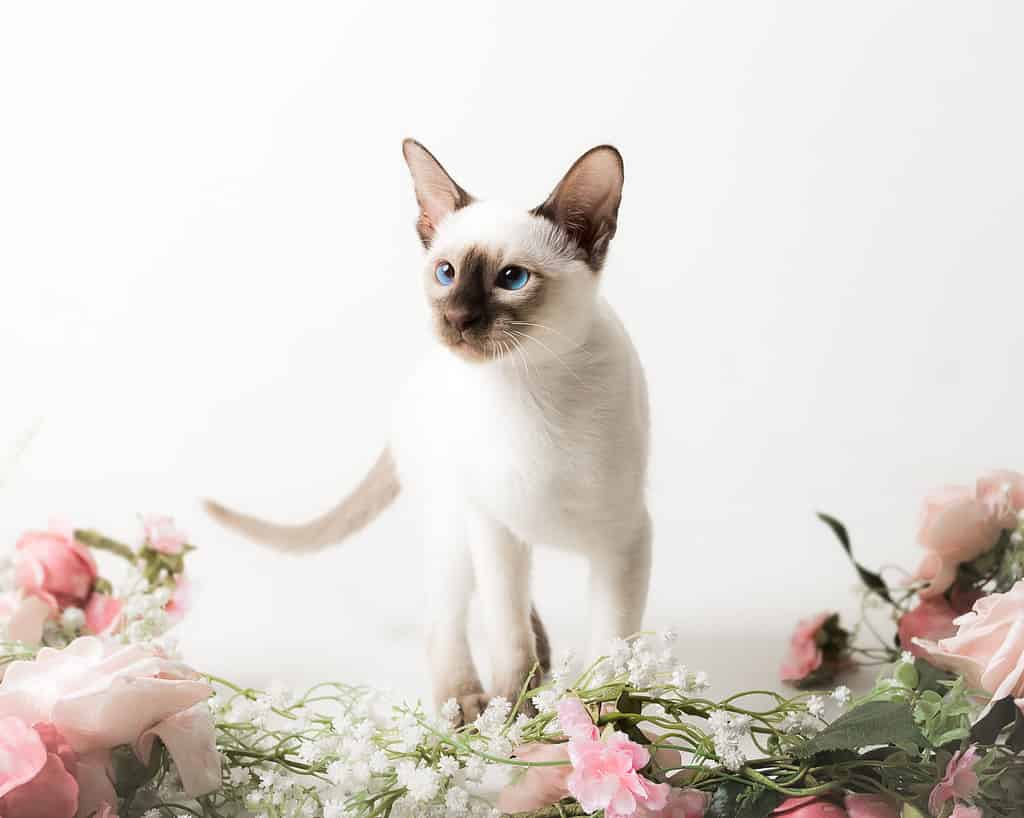
Unfixed cats can be in heat anywhere between one and six weeks.
©Jenna.Photography/Shutterstock.com
As they go through puberty, your kitten will probably feel uncomfortable and have excess energy. Because of this, you’ll want to help them relax.
You can give them catnip to take their mind off the hormonal changes occurring. If your kitten gets excited by catnip, try a different method. You can also give them something warm to sit on like a heated blanket.
Sometimes synthetic cat pheromone diffusers work to help your feline friend relax.
Teething and Scratching Toys
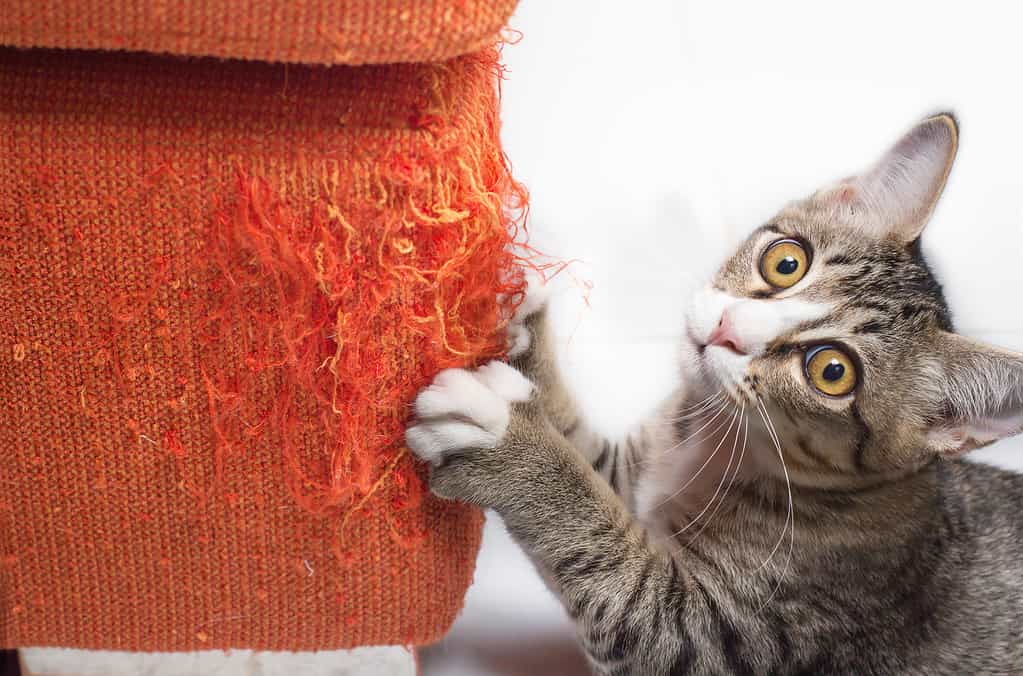
You might be able to tell your kitten’s changing moods by watching its tail.
©noreefly/iStock via Getty Images
While going through puberty, your kitten might act erratically. They might also try extra hard to get your attention. If this is the case, you’ll want to play with them more. This will distract them from the intense hormonal changes they are going through.
To avoid scratches on your furniture, invest in a good-quality scratching post that your kitten. Give them toys that they can chew on, since they’ll lose their baby teeth and start growing permanent ones.
Mental and Physical Exercise
Puberty is a hectic time for kittens, and they’ll look to you to help take their mind off of things. Dedicate extra time in your schedule to play with your furry friend.
You can also give them puzzles or activities to do on their own while you are away.
When to Fix Your Cat
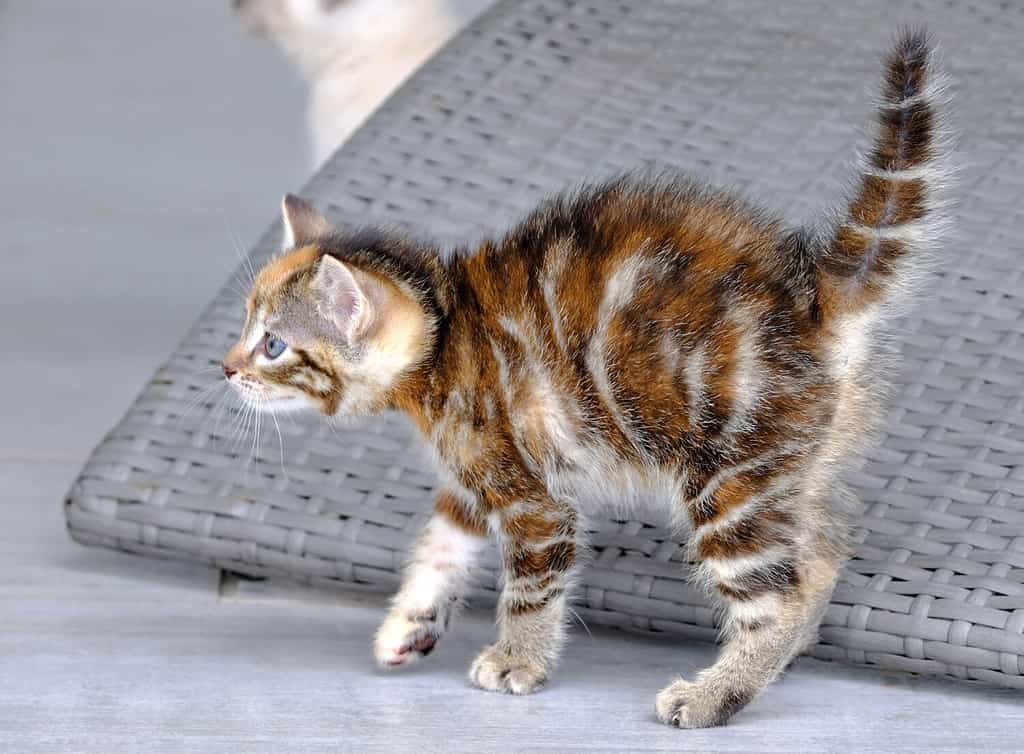
Fixing your animal will cost different prices at the shelter and private vet.
©Narko Polo/Shutterstock.com
Kittens are generally fixed around four to five months of age, which is after most breeds go through puberty.
The minimum accepted weight for anesthesia is two pounds, and some cats reach that before they go through their first heat. If your kitten reaches the minimum weight early, and your vet gives the go-ahead, you can avoid their first heat entirely.
Because of the differences in puberty among cat breeds and sizes, there is no one-size-fits-all schedule for fixing your pet. You’ll want to talk with your vet about when to fix your kitten specifically.
After your cat has had surgery, keep them in a quiet and safe place indoors for the first 18 to 24 hours. They will want to lick the surgery site so keep the cone collar on at all times. Follow any instructions your vet provides and give prescribed pills at the correct times. Go to the vet immediately if you see any signs of infection in the area.
The photo featured at the top of this post is © Bogdan Kurylo/iStock via Getty Images
Thank you for reading! Have some feedback for us? Contact the AZ Animals editorial team.







